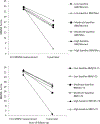The Association Between Body Mass Index, and Cognitive, Functional, and Behavioral Declines for Incident Dementia
- PMID: 30412484
- PMCID: PMC6441968
- DOI: 10.3233/JAD-180278
The Association Between Body Mass Index, and Cognitive, Functional, and Behavioral Declines for Incident Dementia
Abstract
Background: Association between high adiposity and the clinical progression of dementia remains puzzling.
Objective: To separately examine the association between body mass index (BMI) and cognitive, functional, and behavioral declines before, at, and after diagnosis of dementia, and further stratified by age groups, and sex.
Methods: A total of 1,141 individuals with incident dementia were identified from the Uniform Data Set of the National Alzheimer's Coordinating Center. Cognitive function was evaluated by Mini-Mental State Exam, functional abilities were assessed using Functional Activities Questionnaire, and behavioral symptoms were captured by Neuropsychiatric Inventory Questionnaire at each follow-up visit. We used separate linear-mixed effects models to examine the association.
Results: Compared to moderate baseline BMI, high baseline BMI was associated with 0.30-point slower annual progression rates in functional decline. For individuals aged 76 and over, high baseline BMI was associated with 0.42-point faster progression rates in cognitive decline annually. A U-shaped association between baseline BMI and cognitive decline was observed among men.
Conclusion: BMI levels before dementia diagnosis may facilitate the identification of different risk profiles for progression rates of cognitive and functional declines in individuals who developed dementia.
Keywords: Behavior; body mass index; cognition; dementia; disease progression; neuropsychological tests; public health.
Conflict of interest statement
Figures
References
-
- Alzheimer’s Association (2016) 2016 Alzheimer’s disease facts and figures. Alzheimers Dement 12, 459–509. - PubMed
-
- Whitmer RA, Sidney S, Selby J, Johnston SC, Yaffe K (2005) Midlife cardiovascular risk factors and risk of dementia in late life. Neurology 64, 277–281. - PubMed
-
- Kloppenborg RP, van den Berg E, Kappelle LJ, Biessels GJ (2008) Diabetes and other vascular risk factors for dementia: which factor matters most? A systematic review. Eur J Pharmacol 585, 97–108. - PubMed
Publication types
MeSH terms
Grants and funding
- P30 AG013854/AG/NIA NIH HHS/United States
- P30 AG010124/AG/NIA NIH HHS/United States
- P50 AG023501/AG/NIA NIH HHS/United States
- P50 AG005142/AG/NIA NIH HHS/United States
- P50 AG005131/AG/NIA NIH HHS/United States
- P30 AG010133/AG/NIA NIH HHS/United States
- P50 AG016574/AG/NIA NIH HHS/United States
- P50 AG005146/AG/NIA NIH HHS/United States
- P30 AG035982/AG/NIA NIH HHS/United States
- P50 AG008702/AG/NIA NIH HHS/United States
- U54 GM115458/GM/NIGMS NIH HHS/United States
- U01 AG016976/AG/NIA NIH HHS/United States
- P30 AG008051/AG/NIA NIH HHS/United States
- P50 AG005681/AG/NIA NIH HHS/United States
- P30 AG013846/AG/NIA NIH HHS/United States
- P50 AG047270/AG/NIA NIH HHS/United States
- P50 AG005136/AG/NIA NIH HHS/United States
- P30 AG012300/AG/NIA NIH HHS/United States
- P50 AG016573/AG/NIA NIH HHS/United States
- P50 AG047266/AG/NIA NIH HHS/United States
- P50 AG016570/AG/NIA NIH HHS/United States
- P50 AG005134/AG/NIA NIH HHS/United States
- P30 AG008017/AG/NIA NIH HHS/United States
- P30 AG010161/AG/NIA NIH HHS/United States
- P50 AG025688/AG/NIA NIH HHS/United States
- P50 AG005133/AG/NIA NIH HHS/United States
- P50 AG005138/AG/NIA NIH HHS/United States
- P50 AG047366/AG/NIA NIH HHS/United States
- P30 AG010129/AG/NIA NIH HHS/United States
- P30 AG019610/AG/NIA NIH HHS/United States
- P30 AG028383/AG/NIA NIH HHS/United States
- P50 AG033514/AG/NIA NIH HHS/United States
LinkOut - more resources
Full Text Sources
Medical



